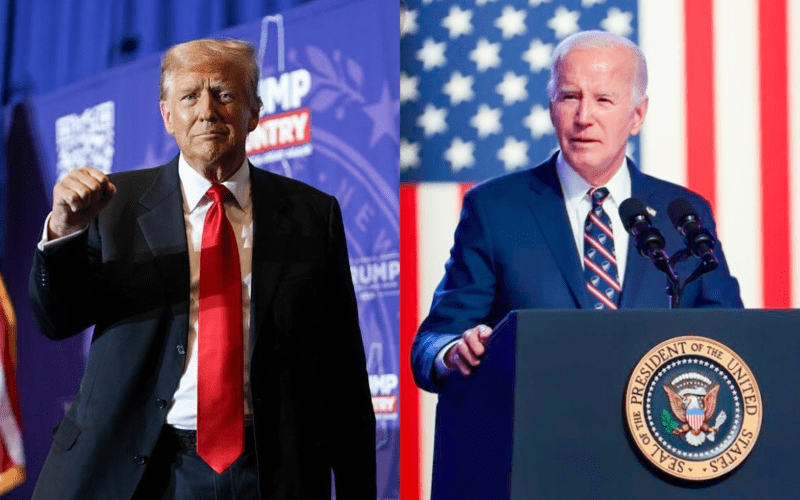Sign up here to receive The Yappie's weekly briefing on Asian American + Pacific Islander politics and support our work by making a donation.
Ahead of President Joe Biden’s State of the Union address, the Biden-Harris campaign plans to unveil a new strategic effort to emphasize the economic and health care costs to AAPIs under a second Trump administration, The Yappie has learned.
The new messaging is a direct response to “Project 2025,” a multimillion-dollar push spearheaded by the conservative Heritage Foundation that lays out its vision for the next GOP presidency. With Project 2025 gaining steam on social media, Biden’s team hopes to co-opt the brand by countering with a “Trump’s Project 2025” framework that ties the former president explicitly to the playbook and makes the stakes clear to AAPI voters—who helped give Biden the edge in several battleground states in 2020—as he faces the possibility of losing their vote due to inflation concerns.
A series of “Trump’s Project 2025” documents will be amplified on social media ahead of the State of the Union on Thursday, where Biden is expected to discuss his approach to rising costs of living as well as his successes lowering prescription drug costs and health care premiums, tackling junk fees, and reducing home energy costs.
A campaign fact sheet first shared with The Yappie blasts former President Donald Trump’s track record with job growth, tax fairness, health care, and more when it comes to AAPIs, who are projected to make up over 6.1% of the eligible electorate this November.
Biden’s team plans to hammer in on Trump’s budget cuts for Social Security, Medicare, Medicaid, and housing and food assistance programs—along with his vow to repeal the Affordable Care Act, which contributed to a 54% reduction in AAPIs’ uninsured rate over six years, and threats to strip away protections for those with preexisting conditions.
On the economy, the campaign will point to Asian Americans’ unemployment rate of 5.8% in December 2020, Trump’s last full month in office—compared to a 3.8% unemployment rate at the beginning of his term—and America’s record loss of 3.3 million jobs over his tenure (though the pandemic contributed to that figure).
The fact sheet also highlights Trump’s tax cuts for big corporations and the wealthy, which according to the racial equity-focused nonprofit Prosperity Now left behind poor AAPI households more than any other group in America, and his abandonment of a brief promise to enact gun control measures.
The campaign will aim to convince AAPIs that Trump’s extreme agenda would continue efforts to “raise costs, jeopardize their Social Security, and rip away their rights,” per the fact sheet. That would include ending student debt relief, rolling back infrastructure and climate funding, banning abortion nationwide, and undoing caps on insulin and prescription drug prices, the campaign team notes.
The Biden campaign does note Trump’s anti-Asian and anti-Muslim rhetoric—including his comment on how immigrants are “poisoning the blood” of America—but chooses to focus on the economic and health care impacts AAPIs would suffer if Trump is elected again.
“Donald Trump has spent years demonizing and attacking the AAPI community,” Biden-Harris 2024 campaign spokesperson Sarafina Chitika said in a statement to The Yappie. “He failed them as president and the Project 2025 agenda is even worse. The AAPI community deserves better.”
Polling shows, however, that many Asian American voters have wavered in their support for Biden in recent years. The president continues to face criticism over his handling of inflation, which remains a top priority for Asian American voters. Though the economy has improved in recent months, wages outpaced inflation during Trump’s first three years in office, something Trump has capitalized on as a line of attack.
Asian Americans have historically backed Democratic candidates and overwhelmingly voted for Biden in 2020, but Trump could still make gains with more Republican-leaning ethnic groups—like Vietnamese Americans, many of whom favor his strong-arm approach with the Chinese government. Indian Americans have also seen a slight shift to the right in recent election cycles, in part because of Trump’s friendly relationship with the controversial Indian Prime Minister Narendra Modi, who has been accused of carrying out a Hindu nationalist agenda.
Other Asian Americans have supported more conservative policies in response to perceptions of increased crime and concerns about their children's education.
Meanwhile, Pacific Islanders who are religious may be swayed by Trump’s promise to restrict abortion and birth control.
In 2020, AAPI voter turnout surged by more than 47% compared to the last presidential election. Nearly half of those who voted in 2020 did not vote in 2016, according to a TargetSmart analysis.
A 2022 APIAVote poll found, though, that over half of AAPI voters said they’d never been contacted by a political party ahead of the midterms.
The Yappie is your must-read briefing on AAPI power, politics, and influence, fiscally sponsored by the Asian American Journalists Association. Make a donation, subscribe, and follow us on Twitter (@theyappie). Send tips and feedback to [email protected].









